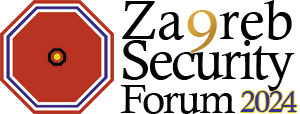
Confirmed speakers and panelists for the 5
th Zagreb Security Forum, scheduled on March 13-14
th, 2020.
At the 5th Zagreb Security Forum you will be able to listen, see and meet following experts that will offer their knowledge from the domains of various critical infrastructure protections (energy, water, and cyber).
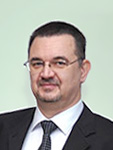
Dr. Gordan Akrap, Hybrid Warfare Research Institute, Croatia
Born 1966, graduated at Zagreb Faculty of electronics and computing in 1994. In 2011 he received a PhD at the University of Zagreb, in the field of Information and Communication sciences. The title of his PhD was “Informational strategies and operations in public knowledge shaping”. He had an active role in Homeland war. During his career in diplomatic and security structures of Croatia he completed a number of professional courses, including Diplomatic Academy. He is active in research of national and regional security, intelligence and history of Homeland War. He published a number of books, and papers in journals and proceedings. He is a founder and present president of Hybrid Warfare Research Institute.
Lina Aburous, Managing director - Strategy, Euraffex group
Lina has more then 15 years of experience in strategic planning, political communications, reputation management, and country branding. Her path was shaped in both public and private sectors, and she has lead strategic planning teams in several governmental and inter-governmental organizations. Lina advised and worked for several heads of states, politicians, and international figures, in Europe, Latin America and the Middle East. On a weekly basis, Lina provides her views on EU current affairs on Politico's EU Confidential podcast, the nominated number one media outlet in Brussels.
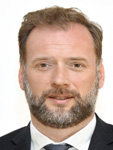 Mario Banožić, PhD, Minister of Defence of the Republic of Croatia
Mario Banožić, PhD, Minister of Defence of the Republic of Croatia
Born in 1979, graduated at the Faculty of Economics in Osijek in 2002. In 2013 he received a PhD at the J.J. Strossmayer University of Osijek, Faculty of Economics. Prior to his appointment as the Minister of Defence, from 2019 to 2020 he served as Minister of State Property. In 2018 he was the Head of the State Administration Office in Vukovar-Srijem County. In his professional experience, he was also the Head of the Internal Auditing Service in Vukovar- Srijem County (2013 – 2014) and the Head of the City Office for Culture and Tourism in Vinkovci (2014 – 2017). He has a solid background in economics and rich experience in business administration as well as a number of published publications, research paper and scientific work. Since 2018, he has been a member of the Main Committee of the Croatian Democratic Union. He is the Chairman of the Management Board of the Social Care Centre of Vinkovci and the Chairman of the Croatian Marketing Association (CROMAR).

Dr. Deniz Yüksel-Beten, Senior Science for Peace and Scurity & Partnership Cooperaiton Advisor
Dr. Deniz Yüksel-Beten graduated from the Université Libre de Bruxelles
(ULB) in Belgium. Dr. Yüksel-Beten
joined NATO’s Scientific and Environmental Affairs Division in January 1991 as
Programme Director of the Committee on the Challenges of Modern Society (CCMS),
dealing with the management of projects, mainly in the field of Environmental
Security. Following the merger of the CCMS and the Science Committee in 2006, she
became Head of the Section Science for Peace and Security (SPS) in the NATO
Public Diplomacy Division, which was thereafter transferred to the newly
established NATO Emerging Security Challenges (ESC) Division.
Since 2010, Dr. Yüksel-Beten
is in charge of the Science for Peace and Security (SPS) Programme as the
Senior SPS and Partnership Cooperation Advisor, working directly with the
Assistant Secretary General for the Emerging Security Challenges. The SPS
Programme, one of the important partnership programmes at NATO, serves the
Alliance’s Strategic Objectives by linking science to society and by developing
projects to address emerging security challenges. The Programme’s Key
Priorities include counter-terrorism, cyber defence, CBRN defence and
security-related advanced technologies.
Dr. Yüksel-Beten
has taken the lead in developing and implementing SPS key flagship projects
with high visibility and public diplomacy value by bringing together networks
of scientists in both NATO member and partner countries, 69 in total.
Furthermore, she has managed capacity-building initiatives in order to project
peace and stability beyond the Euro-Atlantic territory.
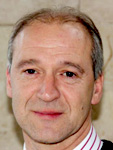 Prof. Dr. Marc Cools, University of Gent
Prof. Dr. Marc Cools, University of Gent
Cools Marc (b. 1962) holds a PhD in Criminology (Free University of Brussels) and certificates in Business Economics (IPO Management School- Antwerp University) and International Management in the Telecommunications Industry (London Business School). He had different higher-management and board positions in the private security services industry: Bell Telephone ITT nv, Alcatel Bell nv, Shield nv and Faceo Security & Prevention nv. Currently, he is a member of the board at Securitas Training nv and member of the Mont Pèlerin Society.
He lectured at the Antwerp Police Academy and at the School for Criminology of the Justice Department. He was advisor for the former Belgian Justice Minister, Mr. Marc Verwilghen. Today he is Professor of Criminology at the Free University of Brussels and at Ghent University, he is also Visiting Professor at the Nyenrode University and Paris X University. He also lectures at Antwerp Management School and at the Intelligence & Security School of the Ministry of Defence.
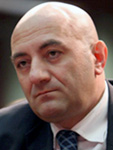 Prof.Dr. Zoran Dragišić is full professor and vice dean for development on Faculty of Security Studies – University of Belgrade.
Prof.Dr. Zoran Dragišić is full professor and vice dean for development on Faculty of Security Studies – University of Belgrade.
He has served in the National Assembly of Serbia since 2016 as part of the parliamentary grouping of the Serbian Progressive Party (Srpska napredna stranka; SNS). He was previously a candidate for president of Serbia in the 2012 presidential election. He graduated from the University of Belgrade Faculty of Security Studies in 1991 as valedictorian and subsequently earned a master's degree (1999) and Ph.D. (2004) from the university's law faculty. He is currently a member of the parliamentary defence and internal affairs committee; a deputy member of three other committees; a deputy member of Serbia's delegation to the NATO Parliamentary Assembly; the head of the parliamentary friendship group with Turkey; and a member of the parliamentary friendship groups with China, Israel, Syria, the United Kingdom, and the United States of America.
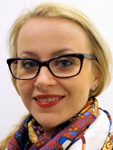 Aleksandra Gasztold, Prof.ucz.dr.hab., political scientist, associate professor, Department of Internal Security, Faculty of Political Sciences and International Studies, University of Warsaw.
Aleksandra Gasztold, Prof.ucz.dr.hab., political scientist, associate professor, Department of Internal Security, Faculty of Political Sciences and International Studies, University of Warsaw.
She conducts research on terrorism, radicalisation using the feminist perspective. Thematic editor (security studies) of the Scientific Quarterly "e-Politikon" of the Political Analyses Center of the University of Warsaw (OAP UW). Expert of the Government Security Centre (RCB). Member of Steering Committee of Women in International Studies in Poland (WIIS Poland). Vice-President of the Anti-Terror System Group Foundation. Selected publications: “A Feminist Approach to Security Studies”, Przegląd Politologiczny 2017, No. 3; Służby specjalne we współczesnym państwie [Special services in a modern state], (co-editor Z. Siemiątkowski, Warsaw 2016); “The Problem of Security Through the Gendered Lens”, Annals of the University of Craiova, 2016, No. 1; „Counterterrorism Systems of Spain and Poland: Comparative Studies”, Przegląd Politologiczny 2015, No 3; In the shadow of human frustration – the problem of terrorism in the Arab countries, in: B. Przybylska-Maszner (ed.), Arab Spring, Poznań 2011.
 Przemysław Gasztold (Ph.D.) is an Assistant Professor at War Studies University in Warsaw, Department of Security Threats and Terrorism, and a research fellow at the Historic Research Office of the Institute of National Remembrance in Warsaw.
Przemysław Gasztold (Ph.D.) is an Assistant Professor at War Studies University in Warsaw, Department of Security Threats and Terrorism, and a research fellow at the Historic Research Office of the Institute of National Remembrance in Warsaw.
He received his Ph.D. from Warsaw University, Faculty of Journalism and Political Science in 2016. He is currently conducting research on Polish intelligence services, on contemporary terrorism, on factions within the Polish United Workers’ Party, on relations between Poland, the Middle East, and African countries, and on the ties between the Soviet Bloc and international terrorism during the Cold War. He has published Koncesjonowany nacjonalizm. Zjednoczenie Patriotyczne “Grunwald” 1980-1990 [Licensed Nationalism. Grunwald Patriotic Union 1980-1990, IPN, Warsaw 2012, 446 pages], and Zabójcze układy. Służby PRL i międzynarodowy terroryzm, [Deadly Conspiracies. Polish Communist Intelligence Services and International Terrorism, PWN, Warsaw 2017, 422 pages]. He is the co-author (with M. Trentin, J. Adamec) of Syria During the Cold War: The East European Connection, Lynne Rienner Publishers, Boulder 2014. He has recently published Towarzysze z betonu. Dogmatyzm w PZPR 1980-1990 [Comrades of Concrete. Dogmatism within the PUWP 1980-1990, IPN, Warsaw 2019, 832 pages]. He is an alumnus of US State Department Study of US Institutions Program on National Security Policymaking at University of Delaware (2019).
 Mr. Holger Haibach, head of the Konrad Adenauer Foundation office in Zagreb and Ljubljana.
Mr. Holger Haibach, head of the Konrad Adenauer Foundation office in Zagreb and Ljubljana.
During his studies in 1997 he was the electoral district assistant of Brigitte Kölsch, Member of the Landtag. From 1995 to 1999 he was a research assistant at the Institute of classic Philology, Justus-Liebig-University, Glessen. From 2002 to 2011 he was a directly elected member of the German Bundestag; Deputy Chairman of the Committee for Human Rights and Humanitarian Aid; Spokesman of the CDU/CSU parliamentary group for Economic Cooperation and Development from 2009 to 2011. From 2005 to 2011 he was an alternate member of the Foreign Affairs Committee and at the same time member of the Subcommittee on Arms Control and Non-Proliferation. From 2011 to 2013 Konrad-Adenauer-Stiftung e.V.: Head of the Foreign Office for Namibia and Angola. From 2014 to 2015 he was named Head of the Chile Foreign office based in Santiago de Chile of the Konrad-Adenauer-Stiftung e.V. From 2015 to 2018 he was Head of Central Tasks and Services Department of CDU Germany. Since 2019 Konrad-Adenauer-Stiftung e.V.: Head of the Foreign Office for Croatia and Slovenia.
Boško Jerončić-Grba is a navy commander of the Croatian Armed Forces, currently working as a lecturer at the Croatian Defense Academy teaching C4I, electronic warfare and radar systems. He graduated from Naval Military Academy in Split, where he specialized in telecommunications and radar systems. During his career, he was regional commander of the electronic warfare center, directly subordinated to the Croatian General Staff. Commander Jerončić-Grba has an extensive war experience having participated in the Croatian War for independence during which he was responsible for tasks of establishing, organizing and directing first Croatian military units specialized in electronic warfare.
Darija Jurko is a navy commander in the Croatian Armed Forces, currently working as a lecturer at the Croatian Defense Academy. She is the United States Naval Academy graduate, where she earned a degree in Systems Engineering. During her naval career, she was serving onboard Croatian Navy war ship as a weapons officer and had different staff duties at the Croatian Navy Headquarters. Currently, she is a PhD student in the Electrical Engineering and Information Technology Study at the Faculty of Electrical Engineering, Mechanical Engineering and Naval Architecture, University of Split, Croatia.
Hrvoje Karna is PostDoc and Lecturer at Croatian Defense Academy.
He holds a PhD in Electrical Engineering and Information Technology from the Faculty of Electrical Engineering, Mechanical Engineering and Naval Architecture, University of Split, Croatia and has more than ten years of experience in the ICT sector working for Siemens and Atos at various positions.
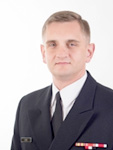 CDR Grzegorz Łyko, PhD, Chief of Staff, NATO STRATCOM Center of Excellence, Riga, Latvia
CDR Grzegorz Łyko, PhD, Chief of Staff, NATO STRATCOM Center of Excellence, Riga, Latvia
CDR Łyko, graduated at Polish Naval Academy in Gdyna, Information operation course and National Defence University, Public affairs course at NATO School, and holds PhD from National Defence University in field of National Security from 2016. He served as Public affairs officer, Strategic communication specialist and in Operational centre of the Ministry of national defence of Poland. Since August 2018 he serves in NATO Strategic Communications centre of Excellence in Riga, Latvia.
 Ir. Yvan De Mesmaeker Secretary general of the European Corporate Security Association – ECSA
Ir. Yvan De Mesmaeker Secretary general of the European Corporate Security Association – ECSA
Yvan De Mesmaeker is a Civil Engineer with over 25 years of professional experience in Corporate Security and Resilience. The European Corporate Security Association - ECSA, a non for-profit Professional Association of Managers and Officials in charge of the Security & Resilience of Corporations and International Institutions.
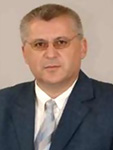 Prof.dr. John M. Nomikos, RIEAS, Greece
Prof.dr. John M. Nomikos, RIEAS, Greece
Director at the Research Institute for European and American Studies, Chairman of the Mediterranean Council for Intelligence Studies (MCIS), Chairman of the Greek Intelligence Studies Association (GISA), Chairman of the European Intelligence Academy (EIA) and Founding Editor, Journal of Mediterranean and Balkan Intelligence (JMBI).
He is Assistant Professor in the Webster University (Athens Campus) and Head, Department of International Relations, History and Politics. He is also Visiting Professor at the Peace Keeping Security Studies (postgraduate program) in the University of Rome (Tre) in Italy. He was Adjunct Professor (2005-2007) at the Department of International Relations in the University of Indianapolis (Athens Camus). He earned his Bachelor Degree in Sociology at the Northeast Louisiana University in 1987, his Masters Degree in European Integration and Cooperation at the University of Hull, 1991, and his Doctorate Diploma in International Relations and Diplomacy at the Washington International University in 2001. He specializes on transatlantic intelligence studies, intelligence reform, and national security architecture. He has done research and studied in various research institutions in USA, UK, Norway, Finland, Germany and Israel.
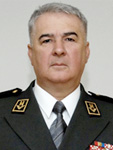 Lt. General Mate Pađen, Commandant of the Croatian Defence Academy “Dr. Franjo Tuđman”
Lt. General Mate Pađen, Commandant of the Croatian Defence Academy “Dr. Franjo Tuđman”
During the Homeland War he assumed a number of command and staff duties: Commander of the Artillery Battery, Deputy Commander and Commander of the Rocket-Missile Division, Chief of Brigade Artillery, Commander of the Ogulin Command Post, and finally Brigade and Regiment Commander. In November 2007, by the Decision of the President of the Republic of Croatia he was appointed the Defense Attaché of the Republic of Croatia to the United States and in April 2008 he was appointed as the Defense Attaché of the Republic of Croatia to Canada as well, based in Washington DC. Upon his return from the United States, on October 1, 2012, he was appointed Deputy Chief of General Staff of the Croatian Armed Forces for Operations, and on June 1, 2014, he assumed the duty of the Director of the General Staff of the Croatian Armed Forces. From March 1, 2015 to December 31, 2017, he was the Military Representative of the Republic of Croatia to NATO and the EU in the Croatian Mission to NATO in Brussels. He was promoted to the rank of Major General on March 29, 2013.
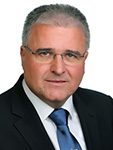 Prof.Dr. Iztok Podbregar is a Full Professor at the Faculty of Organizational Sciences, University of Maribor and Dean.
Prof.Dr. Iztok Podbregar is a Full Professor at the Faculty of Organizational Sciences, University of Maribor and Dean.
His major interests concern crisis management, critical infrastructure and human resource management. He teaches at undergraduate, master and doctoral level. He is author of several monographs, books, scientific articles published in Slovenia and abroad. Prof. Podbregar was National Security Advisor to the President of the Republic of Slovenia, Chief of Staff of Slovenian Army, Former Director of the Slovenian Intelligence and Security Agency, Former Secretary of the Slovenian National Security Council, air-force pilot.
 Matjaž Prah, HEP d.d.
Matjaž Prah, HEP d.d.
He spent 30 years in the field of nuclear safety and security. He was Licensing Manager at the Krško Nuclear Power Plant in Slovenia and later Director General of the Croatian National Nuclear Safety and Security Regulatory Body (State office for Nuclear Safety) from 2005 to 2008 also responsible for development of the subsidiary nuclear safety and security legislation, development and implementation of safeguards measures at national level, and for Technical Cooperation with the IAEA (International Atomic Energy Agency).
He was involved in a number of the international activities regarding nuclear non-proliferation and technical verification regime in the senior management role or as Project Executive such as CTBTO Integrated Field Exercise (IFE) 2008 in Kazakhstan, Noble Gas Field Operational Test 2009 in Slovakia, CTBTO Directed Exercise 2010 in Jordan as well as Integrated Field Exercise (IFE) 2014 in Jordan and in many others. He joined the On-Site Inspection Division (OSI) at the CTBTO in 2009 (UN based Comprehensive Nuclear Test Ban Treaty Organization), where he has been involved in building up the operational readiness of the OSI verification regime element as OSI Divisional Coordinator (role of deputy director). Temporarily, he was re-assigned to be an Special Assistant to the Executive Secretary for the Quality Control and Quality Assurance for the implementation of the on-site inspection programme and oversighted the implementation of the preparatory activities for IFE (February 2013-July 2013) after which he resumed his position of the OSI Divisional Coordinator again.
He was also a co-chairman of the United Nations Geographical Information Working Group (UNGIWG) which members 33 International UN based Organizations from 2011 to 2013.
After concluding his term with CTBTO (March 2016), Mr. Prah has been assigned to be a Head of Department for Nuclear Power Plant Krško in Hrvatska elektroprivreda (HEP). Mr. Prah becomes a member of NPP Krško Safety Committee in June 2019.
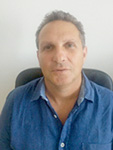 Lt. Col. (res.) Ophir Revach is the Chief Executive Office of the European Jewish Congress's Security and Crisis Center (EJC-SACC).
Lt. Col. (res.) Ophir Revach is the Chief Executive Office of the European Jewish Congress's Security and Crisis Center (EJC-SACC).
With its main headquarters in Vienna, the SACC is active in hundreds of communities all over Europe to enhance security and civil resilience, counter terrorism and violent extremism, and develop community-based security cooperation with law enforcement, intelligence and governments.
Mr. Revach has thirty years extensive experience in these fields working at the Israeli Prime Minister's Office, where he held a number of senior positions in the fields of security, intelligence and crisis management. Before that he served at the Israeli Defense Force as a combat officer. He has graduated his degree in Political Studies at the Bar-Ilan University.
 Prof. Dr. Shlomo Shpiro, president of International Intelligence History association, Israel, Head of the Europa Institute at bar Ilan University and Senior Research Fellow at the BESA Center for Strategic Studies.
Prof. Dr. Shlomo Shpiro, president of International Intelligence History association, Israel, Head of the Europa Institute at bar Ilan University and Senior Research Fellow at the BESA Center for Strategic Studies.
Since 2008 he is also Chairman of the International Intelligence History Association (IIHA). He specializes in intelligence, terrorism and security studies. His research activities concentrate on the role of intelligence services as political mediators in the international arena, the intelligence activities of terror organisations, intelligence ethics and political influence, and on security crisis management and crisis communication.
 Prof.Dr. Polona Šprajc is an Assistant Professor at the Faculty of Organizational Sciences, University of Maribor in the Department of Personnel and Vice dean for educational activity. Her major research interests concern human resource management, marketing and business ethics. She teaches on undergraduate and master level.
Prof.Dr. Polona Šprajc is an Assistant Professor at the Faculty of Organizational Sciences, University of Maribor in the Department of Personnel and Vice dean for educational activity. Her major research interests concern human resource management, marketing and business ethics. She teaches on undergraduate and master level.
She is author of chapters in books and articles in scientific and professional journals, published in Slovenia and abroad.
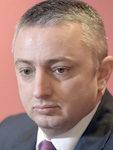 Prof.Dr. Darko Trifunović, Director of the Institute for National and International Security, professor at Faculty of Law, Administration and Security, Megatrend University, Belgrade.
Prof.Dr. Darko Trifunović, Director of the Institute for National and International Security, professor at Faculty of Law, Administration and Security, Megatrend University, Belgrade.
Dr Trifunovic was elected as guest professor at FUDAN University – Center of American Studies, Shanghai, China. Senior Research Fellow and lecturer at Faculty of Security Studies-University of Belgrade. He is Senior Adviser at the Research Institute for European and American Studies, Greece, Athens. He is a specialist in Security studies, Intelligence & Counterintelligence studies as well as Counter-Terrorism, National and International Security studies. He is a former diplomat (First Secretary of the Foreign Service of Bosnia and Herzegovina at the United Nations). Dr. Trifunovic is the representative for Serbia and Montenegro of International Strategic Studies Association (ISSA); Defense & Foreign Affairs publications; and the Global Information System and he is member of the Advisory Board of the Institute of Transnational Studies, Munich, Germany. The Shanghai Center for International Studies appointed him as the first foreign expert for the Olympic Games (2008) security preparation in China. In 2010, he is engaged in World Expo Security preparation and is a Member. Dr Trifunovic is regular speaker at International Counter Terrorism Institute, Tel Aviv, Israel, and Prof.Dr Darko Trifunovic is one of the founding Members of the International Counter Terrorism Academic Community (ICTAC). He has published numbers of academic books papers and articles.
 Dr. Giliam de Valk initiated, coordinated, and lectured at different academies a minor intelligence studies. Dr. G.G. (Giliam) de Valk (1961) studied at the Law Faculty of Leiden University. He wrote his dissertation (2005) at the Law Faculty of University of Groningen on the quality of intelligence analyses: Valk, Giliam de, Dutch Intelligence: Towards a Qualitative Framework for Analysis. Den Haag: Boom juridisch, 2005. Since 2016 he is assistant professor at the Institute of Security and Global Affairs (ISGA) of the Leiden University. He lectures and researches on intelligence, analysis and methodology. After his dissertation he started to work as a lecturer at the Department for Political Science (2006-2008) and at the Institute for Interdisciplinary Studies (2007- 2016) of the University of Amsterdam. At this Institute, he was the initiator and coordinator of the Minor Intelligence Studies (2007-2016). In 2012, he transformed this Bachelor Minor Intelligence Studies into a center: the Ad de Jonge Center for Intelligence and Security Studies. In 2016, he and his team transferred to the ISGA (see above).From 2006-2011, he was a lecturer for the History of International Relations Section at the University of Utrecht. He taught on issues as intelligence studies, strategy (Von Clausewitz), humanitarian intervention, counterinsurgency, terrorism and counter-terrorism.
Dr. Giliam de Valk initiated, coordinated, and lectured at different academies a minor intelligence studies. Dr. G.G. (Giliam) de Valk (1961) studied at the Law Faculty of Leiden University. He wrote his dissertation (2005) at the Law Faculty of University of Groningen on the quality of intelligence analyses: Valk, Giliam de, Dutch Intelligence: Towards a Qualitative Framework for Analysis. Den Haag: Boom juridisch, 2005. Since 2016 he is assistant professor at the Institute of Security and Global Affairs (ISGA) of the Leiden University. He lectures and researches on intelligence, analysis and methodology. After his dissertation he started to work as a lecturer at the Department for Political Science (2006-2008) and at the Institute for Interdisciplinary Studies (2007- 2016) of the University of Amsterdam. At this Institute, he was the initiator and coordinator of the Minor Intelligence Studies (2007-2016). In 2012, he transformed this Bachelor Minor Intelligence Studies into a center: the Ad de Jonge Center for Intelligence and Security Studies. In 2016, he and his team transferred to the ISGA (see above).From 2006-2011, he was a lecturer for the History of International Relations Section at the University of Utrecht. He taught on issues as intelligence studies, strategy (Von Clausewitz), humanitarian intervention, counterinsurgency, terrorism and counter-terrorism.
- 2006 onwards, he participates as a guest lecturer in the analyst education of the Defense Intelligence and Security Institute (DISI).
- 2010-2012, he was employed at the Netherlands Defense Academy in Breda, at Faculty of Military Sciences, where he had put up and coordinated a Bachelor Minor Intelligence Studies.
- 2004-2012, he was the secretary of the Netherlands Intelligence Security Association, of which he is still a board member.
- 2006-2012, he was a member of the Archive Committee of Ministry of Foreign Affairs.
- Since 2009, he participates in the Dutch Counterinsurgency Network.
- Since 2012, he is a member of the Dutch Think Tank Integral Security.
- De Valk participates for many years in Red Team exercises concerning vital infrastructure and corporate business.
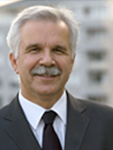 Prof.Dr. Mladen Vedriš, University of Zagreb, Faculty of Law – Head of Department of Economic Sciences.
Prof.Dr. Mladen Vedriš, University of Zagreb, Faculty of Law – Head of Department of Economic Sciences.
Prof.Dr. Mladen Vedriš was born on 29 December 1950 in Zagreb. His scientific research career began at the Center for the Research of Migration of the University of Zagreb. In 1990, he became president of the executive council of the city of Zagreb (the equivalent today is the position of mayor). In 1992, he became a member of the national government, eventually serving as the deputy prime minister for economics. From 1993 to 1995 he was president of the Croatian Chamber of Commerce. In 1996, he founded the strategic consulting company Sonder d.o.o. Since 2005, he has been a professor at the Faculty of Law in Zagreb and the head of the Department of Economic Sciences. He has been a member of the council of the Croatian National Bank, the president of the Advisory Council for the Agency for Promoting Exports and Investment, a member of the Economic Council of the Prime Minister of Croatia, and since 2011, president of the Partnership Council of Zagreb. He is an expert in the area of macroeconomic analysis, regional development, industrial policy, and competitiveness. He has published several scientific and professional works and has participated in several foreign and domestic scientific research projects.
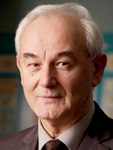 Prof. Dr. Slavko Vidović, Infodom d.o.o. Croatia.
Prof. Dr. Slavko Vidović, Infodom d.o.o. Croatia.
Throughout his career he has been active in leading large-scale projects in the area of state authority, public companies and organisations. In addition to that, through his scientific-educational efforts he has contributed to a number of scientific and research projects, such as artificial intelligence-specific area, supporting systems in decision-making and application development.
He lectures at the Faculty of Organisation and Informatics of the University in Zagreb and holds membership at the National Competitiveness Council, PMI and Tele Management Forum.
Dr. Vlasta Zekulić, NATO HQ - Operations Division
Dr Zekulic works for NATO’s HQ,
Operations Division, Operational Preparedness and Planning Section. She joined
the NATO International Staff after completing her Croatian military career as a
Lieutenant Colonel in 2017.
As an infantry and
military police officer, she held numerous command and staff positions,
including several deployments to operational theatres. Since late 2014 she
served at the Allied Command Transformation, Strategic Plans and Policy
Division, where she led the development of high level policy papers and
strategies on hybrid warfare, resilience, and Readiness Action Plan. This work
led to a posting as a deputy head in the Strategic Assessment Element of the
Emergency Security Challenges division in NATO HQ. In this capacity she worked
on developing strategic assessments aimed at identifying emerging crisis and
enhancing situational awareness for use by the Secretary General and the
Chairman of Military Committee. In her current role she leads development of
operational policies and strategic-level assessments to bolster Alliance’s
deterrence and defence posture, preparedness and crisis management. She holds bachelor degrees
in computer science, criminalistics and criminology, as well as masters and PhD
in International Relations and National Security.